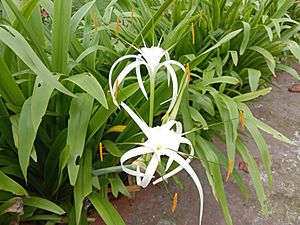Beach spider lily facts for kids
Quick facts for kids Beach spider lily |
|
|---|---|
 |
|
| Scientific classification |
|
| Kingdom: | Plantae |
| Clade: | Tracheophytes |
| Clade: | Angiosperms |
| Clade: | Monocots |
| Order: | Asparagales |
| Family: | Amaryllidaceae |
| Subfamily: | Amaryllidoideae |
| Genus: | Hymenocallis |
| Species: |
H. littoralis
|
| Binomial name | |
| Hymenocallis littoralis |
|
| Script error: The function "autoWithCaption" does not exist. | |
| Synonyms | |
|
List of other names
|
|
Script error: No such module "Check for conflicting parameters".
The Hymenocallis littoralis, often called the beach spider lily, is a type of plant in the Amaryllidaceae family. It grows naturally in warmer coastal areas of Latin America. This plant is also widely grown and has spread to many other tropical countries around the world.
What's in a Name?
The name Hymenocallis comes from Greek words. It means 'membraned beauty'. This refers to a special part of its flower called the filament cup.
The word littoralis means 'growing by the seashore'. This tells us where the plant likes to live.
About the Plant
The Beach spider lily is a bulbous perennial herb. This means it grows from a bulb, lives for many years, and does not have a woody stem. It usually grows to be about 60–70 cm (24-28 inches) tall.
The bulb itself is about 7–10 cm (3-4 inches) wide. As the plant gets older, the top part of the bulb can grow into a 'neck' up to 4–5 cm (2 inches) thick.
The flowers are large and white. They have a lovely vanilla scent. Each flower has a long tube, about 14 to 17 cm (5 to 7 inches) or even longer. The flower parts are connected to a cup-like structure inside the flower.
Where It Grows
The Beach spider lily is native to several countries in Central and South America. These include Belize, Brazil, Colombia, Costa Rica, Honduras, Mexico, Nicaragua, Panama, Peru, and Venezuela.
It has also spread and now grows naturally in many other tropical places. Some of these places include Angola, Hawaii, India, the Philippines, and various islands in the Pacific and Indian Oceans.
Growing Beach Spider Lilies
People often grow the Beach spider lily as an ornamental plant because of its beautiful flowers. It needs sunlight or partial shade to grow well. Its white flowers usually bloom from mid-summer to late autumn.
This plant can even be grown in water, making it a good choice for ponds or water gardens.
The Tasmanian Fire Service lists Hymenocallis littoralis as a plant that does not catch fire easily. This means it is a good plant to grow near buildings to help protect them from fires.
See also
 In Spanish: Hymenocallis littoralis para niños
In Spanish: Hymenocallis littoralis para niños
 | DeHart Hubbard |
 | Wilma Rudolph |
 | Jesse Owens |
 | Jackie Joyner-Kersee |
 | Major Taylor |

